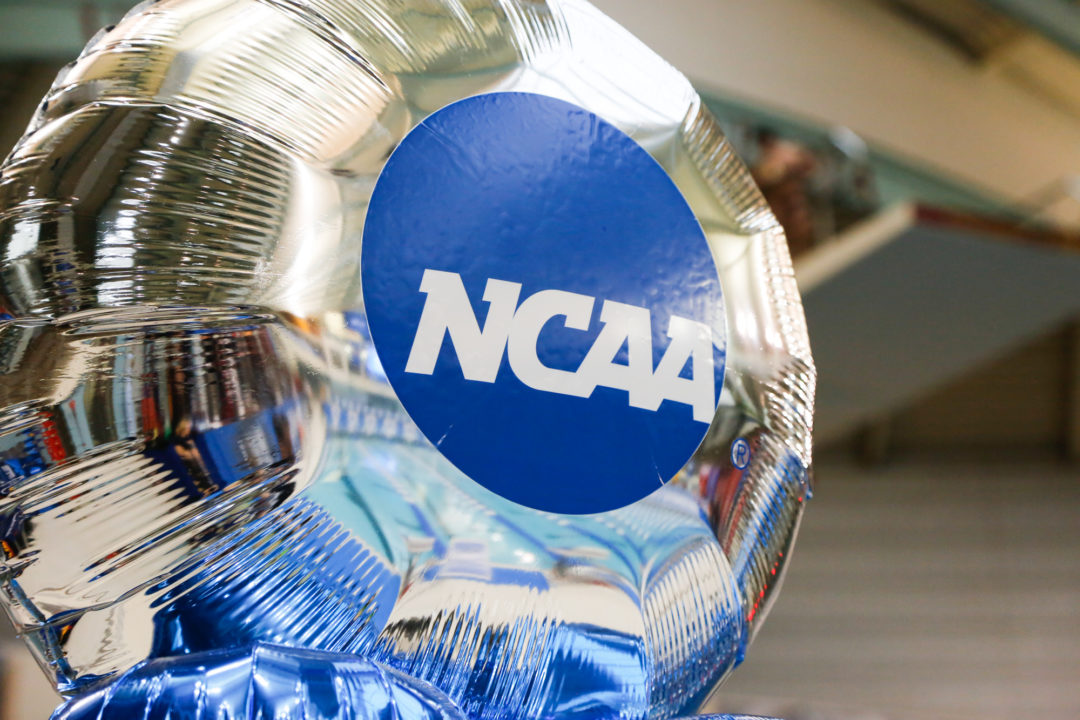The NCAA has approved optional video review for 15-meter violations, per a press release this week.
The NCAA Playing Rules Oversight Panel approved the rule change, according to a press release Wednesday. The rule will go into effect for the upcoming 2019-2020 NCAA season for both men’s and women’s swimming.
The rule change doesn’t necessarily mean video review will be a part of all (or even any) NCAA competitions this season. The rule merely makes video review optional. It’ll be up to “meet committees” to decide when video reviews will or won’t be conducted.
The press release does lay out some specifics of how video review will be implemented:
- All video reviews will be conducted “before qualifiers/results are announced.” That would appear to mean video review would happen while results remain unofficial during a meet.
- Only the meet referee and a non-partisan (not affiliated with any specific particpating school) conference or NCAA meet committee representative will be allowed to see the video. Coaches and athletes are not allowed to see the video.
- Coaches cannot “challenge” calls to bring up video review.
The release also runs through a few more rule changes approved by the Playing Rules Oversight Panel:
- Timing malfunctions: the panel changed how times are calculated when the primary timing mechanism fails. The release says the new method is “more in line with USA Swimming and international swimming rules.”
- If 2 of the 3 valid button or watch times agree, that time is accepted.
- If the three button or watch times are all different, the middle (intermediate) time will be the time taken.
- If there are only 2 valid button or watch times, they are averaged, dropping any thousandths digits without rounding.
- If there is only one valid button or watch time, that time is accepted, unless that time “conflicts with other information.”
- Diving ties: when divers tie for 8th place in non-NCAA and NCAA championship meets, the meet should take 9 divers to the championship final.
- Number of officials: dual, double-dual and triangular/quadrangular meets require at least two officials. Championship and invite meets require at least 4 officials. (This rule takes effect this year in Division I, but not until 2020-2021 for Divisions II and III).
- Optional lap counters: lap counters have been made optional and “can be placed at the end or on either side of the pool.” The release does not specify this rule to only distance events.

IU holding their breath and waiting for the approval on video review for double dolphins off of pull-outs…. someday it’ll happen
Darn nice of the NCAA
Go back and take away Auburn’s 2008 NCAA medley relay victory, please (re Alexei Puninski’s first 25 on the fly leg). So blatant – the mark might have been between his hip and knee when he surfaced.
Absolutely it was a travesty…the judge was standing at the 15 m and looked at it…the fans ALL gushed a loud OOOOHHHHHHH! BUT the guy stood there frozen indignantly. Sad for swimming.
Is there a link to race footage
https://youtu.be/zj0jA1GSHR8
Thanks for posting the video, DMACNCHEEZ. Downvoters (Auburn alums?) – go ahead and watch, please 🙂
I’ll admit I was wrong…in that the mark is actually more at his ankles when he surfaces 😉
Optional lap counters for all events?
Yea sometimes you can lose count in a 50.
I’ve always needed one for the 50 free…i cant keep track sometimes
I would love to see a sprinter use one for the 200. On the starting end of the pool.
Brook, while not a sprinter, could have used that this season her 4×200 anchor
ooooooh giiirrrrrl…dq’s for all!
“Only the meet referee and a non-partisan (not affiliated with any specific particpating school) conference or NCAA meet committee representative will be allowed to see the video”
So these non-partisan ppl can just arbitrarily decide to review? Or does a dq need to be called by an official first?
It doesn’t say that the unaffiliated representative will call for reviews, only that they are one of two people allowed to see video. The release isn’t very specific, but it appears meets themselves can decide when video review will be triggered: only when there are DQs, when officials disagree with one another, when officials specifically call for review, etc.